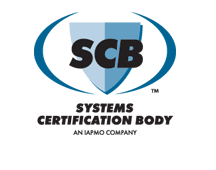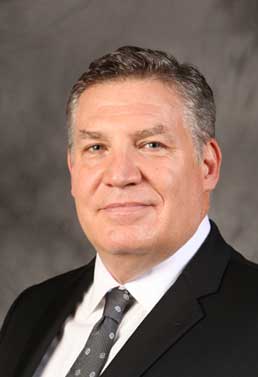In 1995, GP Russ Chaney and Dave Viola met while serving together on an Educational Testing Services (ETS) committee that developed plumbing exam questions for inspectors. Chaney was with the National Association of Plumbing Heating Cooling Contractors (NAPHCC), and Viola was with BOCA International. During one of these meetings, Chaney excused himself to take a phone call in which he accepted the position of IAPMO executive director (and ultimately chief executive officer). He resigned from the committee due to the conflict of interest.
The two men were competitors until 1998, when Viola left BOCA International (which became the International Code Council) to serve as technical director for the Plumbing Manufacturers Institute (PMI). In 2007, Chaney recruited him to be IAPMO’s senior director of Technical Services, a position he held until being promoted to chief operating officer/executive vice president.
A quarter-century after answering the call to lead IAPMO, Chaney has passed the baton to Viola.
“Who’d have thought 25 years after Russ left our exam writing committee, we’d be here today talking about the indelible mark that he has left on our industry and that I would be stepping in to fill his big shoes,” Viola said.
Viola’s nearly 14 years with IAPMO and decades in the industry have prepared him to continue what Chaney started. Before joining IAPMO, he was technical director for the Plumbing Manufacturers Institute (PMI) for nine years, and BOCA International and the International Code Council (ICC), where as a staff engineer he managed the development of their plumbing code and associated training and support publications. He holds a degree in mechanical engineering from Northern Illinois University.
“I have great confidence that Dave and the staff will continue positioning IAPMO as a major industry contributor to public health and safety,” Chaney said. “Dave is well-respected and has been recognized as an industry thought leader for well over two decades, so I’m thrilled that Dave will lead IAPMO for years to come.”
IAPMO Chief Administrative Officer Gaby Davis, who worked side by side with Chaney during his entire tenure, said Viola was the obvious choice to take over as CEO.
“Dave and I have worked closely together for many years now and he’s perfectly suited to lead our staff into the next chapter,” Davis said. “He understands the technical aspects of our business and the people behind the scenes who help facilitate it all. I look forward to this next chapter with Dave as our CEO. And I’m excited for him!”
Viola said his primary goal will be ensuring that IAPMO is as influential and financially healthy when the next CEO takes the reins as it is today. This includes continuing the great work that IAPMO’s nonprofit organization, the International Water, Sanitation and Hygiene Foundation, is doing to bring safe, potable water and proper sanitation to those who need it most.
It’s difficult to predict what will happen this year, Viola said, as there is great uncertainty regarding how quickly the nation will recover economically from the pandemic and how long it will take to return to a more normal business environment.
“A priority will be to focus on listening to and working with our clients and our members during these uncertain times, understanding how we can best react to their needs, and doing so well and quickly,” he said. “We will certainly pay very close attention to our governmental members, as we expect that city, state and federal government budgets will be severely constrained until the economy recovers.”
He said the goal for his first 100 days is to keep IAPMO’s services and initiatives moving forward.
“As the restrictions on our partners loosen and they allow us back into their facilities, we want to do the due diligence with our industry commitment to product certification and continuous compliance,” he said. “Internally, we are putting in place tools that make our teams more effective and allow us to closely monitor our bottom line. There is a backlog of face-to-face meetings that need to happen with our partners, industry stakeholders and jurisdictional leaders, and if the communication challenges remain, we will use the technology to make sure our voice is heard. I will use all the means available to us to ensure our important messages reach the decision makers, whether they be code advocacy, industry partners or clients.”
More jurisdictions adopting IAPMO’s Uniform Codes, both domestically and internationally, is also a top priority. Viola suspects local governments are likely to face budget constraints that will slow the adoption of updated codes and result in job losses for code officials. Consequently, it will be important to show what sets the Uniform Codes apart from the others.
“We believe we have the most advanced and comprehensive codes available for adoption from any organization,” he said, “and one of my objectives is to make that fact more apparent to stakeholders in jurisdictions across the country and the globe.”
IAPMO’s ability to garner the participation and support of the brightest minds in the plumbing and mechanical industries sets the organization apart and results in its codes having the most progressive provisions that address the industry’s current problems, he said. Viola cited such examples as the Water Demand Calculator and Legionella content in the UPC and UMC, as well as the ability to develop the Green Plumbing and Mechanical Code Supplement (GPMCS) — the nation’s first green construction code, now known as the Water Efficiency and Sanitation Standard (WE-Stand) — which he said is supported by the most impressive assembly of water and plumbing experts anywhere.
“Our competitors’ codes embody such a large scope that it’s simply not possible for them to compete with us in terms of plumbing and mechanical leadership,” he said.
Viola said one of IAPMO’s most important new initiatives will be heightened collaboration with the World Health Organization, the World Plumbing Council and other generous industry partners on improving water access and sanitation within the United States and around the world, including new projects through IWSH.
“The COVID-19 pandemic has set back efforts on improving water access and sanitation, and we’ll need to play catch-up in many ways to make up for lost time,” he said.
From a legislative standpoint, Viola said governments need to invest in and improve the nation’s water infrastructure to bring about uniformity in the quality of water being delivered to buildings. IAPMO also supports legislation requiring building owners and facility managers to oversee water system quality, especially in health care facilities.
Dain Hansen, IAPMO’s executive vice president of Government Affairs, said IAPMO, its members, stakeholders, and the entire industry will benefit from Viola’s leadership.
“With his experience in varying capacities in the plumbing industry, his steady discipline and vision, and strategic mind, he is the right person to lead IAPMO into this next chapter,” Hansen said.
Like most organizations that are involved in the technical fields, IAPMO needs to invest more time toward addressing workforce development and diversity concerns, Viola said.
“We will be working, along with other industry partners, on ways to bring more young people into the plumbing and mechanical trade,” he said. “Minorities are underrepresented in the plumbing and mechanical fields and it’s important that we work to change that.”
Looking further down the road, Viola said numerous international opportunities exist for IAPMO products and services over the next five years, despite the rise in nationalism and territorialism that has tempered growth for many industries.
Executive Vice President of Lab Recognition and Asia Pacific Operations Jin Luo said Viola is well prepared to capitalize on those opportunities.
“Through his trips to visit our strategic partners and clients overseas, Dave has seen the international opportunities firsthand, and always emphasized the importance of continuing to develop the markets to offer IAPMO R&T’s certification services,” Luo said.
Viola added that there is also a great opportunity to support emerging technologies, especially those that work to address water quality, scarcity and safety.
In his time with IAPMO, Viola has overseen divergent areas of The IAPMO Group, including strategy, industry outreach, training and education, international and custom code development, promotion of IAPMO programs and services, ASSE International, and the GPMCS/WE-Stand.
In fact, if asked pre-pandemic what his biggest accomplishment at IAPMO was, Viola would have cited the GPMCS or working with Chaney to establish IWSH.
Today, however, he would give a different answer.
“I now believe my biggest accomplishment has been working with Chaney in guiding IAPMO though the pandemic,” Viola said. “Although we are not fully out of the woods yet, IAPMO is positioned very well for continued growth and success in the post-COVID future. I am very proud of IAPMO’s work to protect and retain all staff, immediately and successfully pivoting to teleworking while maintaining and expanding upon our capabilities and high standards of service to our members and customers.
President Trump and the U.S. Department of Homeland Security immediately identified plumbers and other tradespeople as “essential critical infrastructure workers.” IAPMO responded immediately to provide leadership, access to resources and find solutions while much of the industry was still trying to assess the gravity of the crisis, he said.
“We were one of the first associations to address the outbreak, releasing a white paper in March that examined the potential transmission of COVID-19 in plumbing sanitary systems,” Viola said. “Our COVID-19 Resources web page has some of the most comprehensive content available, including several guidance documents provided by IAPMO with information on how to keep plumbers safe.”
IAPMO also brokered an agreement with the American Water Works Association (AWWA) to provide a guidance document on water stagnation and flushing and is working on a Manual of Recommended Practice that will address how to maintain water systems and prepare for the next emergency that could result in building shutdowns.
Viola said he has worn many hats during his 35 years in the industry, and each has played a vital role in giving him perspective and preparing him to be IAPMO’s CEO. He credits his father with not only getting him interested in plumbing and instilling in him a love for the craft, but also for teaching him how to get things done with teamwork.
“He showed me how to organize a job and get the right people to do the correct job,” Viola said. “Working with Russ has taken those foundations and shown me how to do that on a much larger scale, with contributors from diverse backgrounds and different agendas to get accomplished what needed to be done. If I can emulate his ability to gain cooperation from so many interests and garner alignment of goals, IAPMO will continue as a solid resource for the global industry.”
Viola said he looks forward to building on Chaney’s legacy.
“I am humbled and energized by the opportunity the IAPMO board has given me to assume leadership of a great global institution that has played a vital role in protecting public health and safety,” Viola said. “Our goals remain consistent with the original vision of those founding inspectors 95 years ago: provide safe and sanitary plumbing systems. Over the years, our mission has grown to include other key aspects of the built environment; however, we stay true to a narrow segment focus with peerless expertise and capabilities unmatched by any competitor. I sincerely thank the board and Russ for the trust they’ve placed in me.”
































